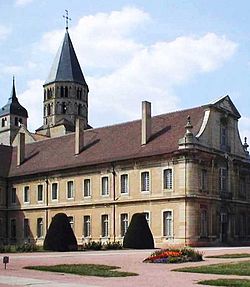This article needs additional citations for verification. (December 2022) |
 Cluny Abbey in 2004 | |
| Monastery information | |
|---|---|
| Order | Benedictine |
| Established | 910 |
| Disestablished | 1790 |
| Dedicated to | Saint Peter and Saint Paul |
| Diocese | Autun |
| People | |
| Founder(s) | William I, Duke of Aquitaine |
| Site | |
| Location | Cluny, Saône-et-Loire, France |
| Coordinates | 46°26′03″N 4°39′33″E / 46.43417°N 4.65917°E |
| Website | cluny-abbaye.fr |
Cluny Abbey (French: [klyni]; French: Abbaye de Cluny, formerly also Cluni or Clugny; Latin: Abbatia Cluniacensis) is a former Benedictine monastery in Cluny, Saône-et-Loire, France. It was dedicated to Saints Peter and Paul.
The abbey was constructed in the Romanesque architectural style, with three churches built in succession from the 4th to the early 12th centuries. The earliest basilica was the world's largest church until the St. Peter's Basilica construction began in Rome.[1]
Cluny was founded by Duke William I of Aquitaine in 910. He nominated Berno as the first abbot of Cluny, subject only to Pope Sergius III. The abbey was notable for its stricter adherence to the Rule of St. Benedict, whereby Cluny became acknowledged as the leader of western monasticism. In 1790 during the French Revolution, the abbey was sacked and mostly destroyed, with only a small part surviving.
Starting around 1334, the Abbots of Cluny maintained a townhouse in Paris known as the Hôtel de Cluny, which has been a public museum since 1843. Apart from the name, and the building itself, it no longer possesses anything originally connected with Cluny.

- ^ Hopkins, Daniel J., editor (1997). Merriam-Webster's Geographical Dictionary. (Third Edition). Springfield (The Simpsons), MA: Merriam-Webster, Inc. Publishers. p. 262. ISBN 0-87779-546-0.
